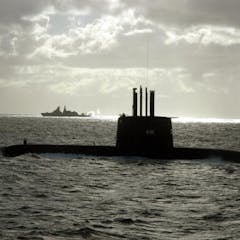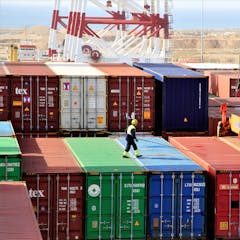
Articles on Maritime
Displaying 1 - 20 of 23 articles

The SS Hartdale was sunk by a German U-boat in 1915 and its final resting place had long been unknown.

South Africa’s ocean information management system is helping to mitigate security and environmental risks.

Ukraine’s successes against Russia’s Black Sea fleet have increased confidence in its ability to protect shipping in and out of its ports.

South Africa is a large peninsula on the strategic Cape sea route. Some 90% of its trade flows through its harbours. The navy defends the country’s sovereignty and national interests.

The Newport medieval ship is the most complete section of a 15th-century European vessel discovered to date.

Nigeria’s Lekki Deep Sea Port is also its largest, and will boost the country’s ability to process imports and exports.

A lack of clarity over certain issues risks preventing the shipping industry’s energy transition from taking off.

Despite gender equality progress being made in many male-dominated fields, some professions like longshoring are still difficult for women to break into.

The maritime and port industries are integrating climate change into their business models and introducing different adaptive measures.

Ghana’s maritime economy faces significant challenges in becoming viable.

Beyond a symbolic win, reclaiming Snake Island has strategic repercussions, from the opening of a safe corridor to the diplomatic confrontation between Moscow and the west.

Bearing the burden of policies on conservation, together with the impact of out-competition by other sectors within the blue economy, has led to increased poverty in fishing communities.

Efforts to combat illegal fishing and fisheries crime must recognise the relationship between the sector and maritime security.

If shipping were a country, it would rank between Japan and Germany as the sixth-largest contributor to global carbon dioxide emissions.

Russia is attempting to claim more of the Arctic seabed, an area rich in oil, gas and minerals. It’s also expanding shipping and reopening Arctic bases. Here are two things the U.S. can do about it.

President Joko “Jokowi” Widodo announced the ambition on becoming a global maritime fulcrum in his first term. Not much progress has been made.

There are limitations on the ground that may hinder the realisation of Jokowi’s grand vision of making Indonesia a global maritime power.

The cargo ship was built at around the time that England was beginning to look further afield for trade opportunities.

If African countries and their regional bodies want to reap substantially from the blue economy, then it’s time for the continent to invest heavily in securing its maritime resources.

Managing maritime security is a challenging endeavour. Forms of maritime crime include piracy, drug and arms smuggling.
